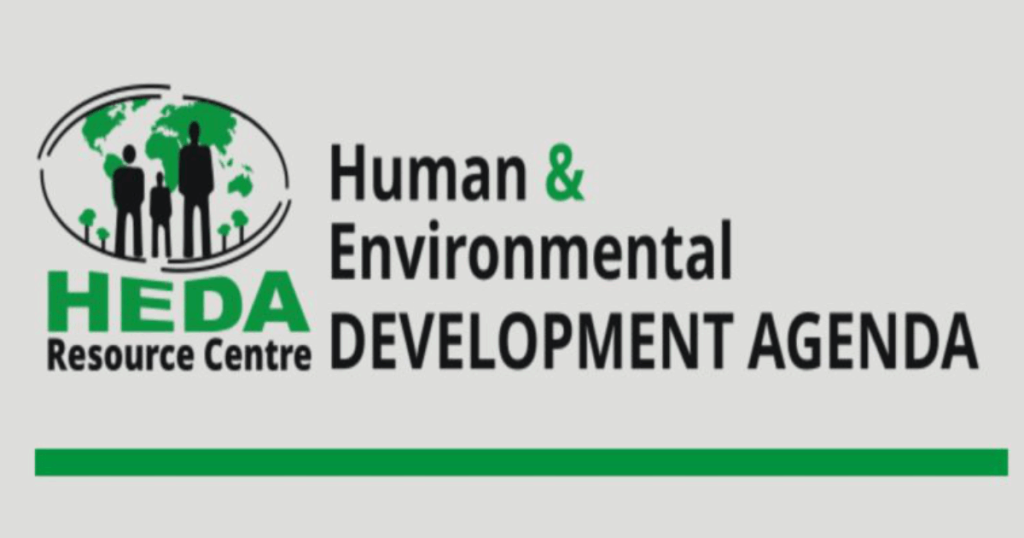The Human and Environmental Development Agenda Resource Centre (HEDA) has issued a potent call to action, urging the Nigerian Senate to broaden its current focus on crude oil theft and hold International Oil Companies (IOCs) accountable for the extensive environmental damage and economic injustices inflicted upon the Niger Delta region over decades. While commending the Senate’s efforts to collaborate with security agencies in tackling oil theft, HEDA emphasizes that true justice for the Niger Delta requires addressing the deeper, more insidious issue of environmental and economic plunder by multinational oil corporations. HEDA argues that the Senate’s focus on local oil theft, while important, overlooks the larger issue of environmental degradation and economic exploitation by IOCs, which constitutes a more significant and enduring form of theft.
HEDA accuses IOCs of attempting a quiet divestment from their onshore assets in Nigeria, seeking to exit without rectifying the devastation they have wrought upon host communities. This attempted exit, HEDA contends, is unacceptable, given the decades of operation with minimal regard for the environment or the well-being of the local population. The organization demands that these companies be held responsible for cleaning up the environmental mess they have created before they are allowed to depart. HEDA’s position underscores the urgent need for accountability and remediation, emphasizing that the long-term consequences of environmental damage and economic injustice far outweigh the immediate concerns of oil theft. The organization’s call for action highlights the ethical imperative of ensuring that corporations operating within a nation’s borders are held responsible for their actions and do not escape the consequences of their environmental and social impacts.
HEDA’s Chairman, Olanrewaju Suraju, responding to a meeting between the Senate Ad-hoc Committee on Crude Oil Theft and the Inspector-General of Police, argues that securing oil assets, while necessary, is only a partial solution. True justice for the residents of the Niger Delta, Suraju insists, cannot be achieved through police action alone. The Senate, he argues, must also confront the long-standing impunity enjoyed by multinational oil companies if it genuinely aims to put an end to economic sabotage. This impunity, HEDA argues, has allowed IOCs to operate for decades without facing adequate consequences for their actions. The organization’s stance highlights the need for a multi-pronged approach to addressing the complex issues facing the Niger Delta, one that goes beyond addressing immediate security concerns and tackles the root causes of environmental and economic injustice. HEDA emphasizes the interconnectedness of environmental protection, economic justice, and corporate accountability in achieving sustainable development and lasting peace in the region.
HEDA’s advocacy extends beyond mere rhetoric. The organization has consistently championed the cause of affected communities, petitioning Nigerian authorities and international accountability bodies to address the issue of hasty divestment by IOCs. They have persistently called for the remediation of polluted sites and the compensation of affected communities, citing legal rulings against some IOCs. However, Suraju laments the weakness of local enforcement mechanisms, hindering the effective implementation of environmental justice. The organization’s actions demonstrate a commitment to holding IOCs accountable, not only through public advocacy but also by actively engaging with legal and regulatory processes. HEDA’s efforts underscore the importance of robust legal frameworks and effective enforcement mechanisms in ensuring corporate responsibility and protecting the rights of affected communities.
The scale of the problem is staggering. Data from the Nigerian Upstream Petroleum Regulatory Commission reveals that Nigeria lost over 353 million barrels of crude oil, valued at approximately $25.7 billion, to theft between 2002 and 2025. However, HEDA warns that the costs associated with environmental degradation, displacement, and corporate negligence could be even higher. These figures, though substantial, fail to capture the full extent of the damage. The immeasurable costs of environmental degradation, displacement, and corporate negligence paint a grim picture of the long-term consequences of unchecked oil operations. HEDA’s emphasis on these hidden costs brings to light the broader societal and ecological impacts that often go unaccounted for in traditional economic assessments. The organization challenges the prevailing narrative that focuses solely on oil theft, arguing that the true cost of environmental damage and social injustice must also be considered.
In a resounding call to action, HEDA implores the Nigerian Senate to demonstrate the same urgency in enforcing environmental justice as it does in curbing oil theft. The organization stresses that communities in Bayelsa, Rivers, Delta, and other affected areas continue to bear the brunt of the health, economic, and ecological consequences of oil extraction and must not be abandoned. HEDA calls on the Senate to rise above political considerations and protect the dignity and rights of the Nigerian people. The organization emphasizes that anything less than holding IOCs fully accountable for their actions constitutes a grave injustice. HEDA’s appeal transcends political rhetoric, emphasizing the fundamental human rights of the affected communities and calling for immediate action to address the long-standing issues plaguing the Niger Delta. The organization’s call to action represents a powerful plea for justice, demanding that the long-term well-being of the people and the environment take precedence over short-term economic gains and political expediency. HEDA’s stance reinforces the fundamental principle that sustainable development requires a holistic approach that encompasses environmental protection, social justice, and economic prosperity.














